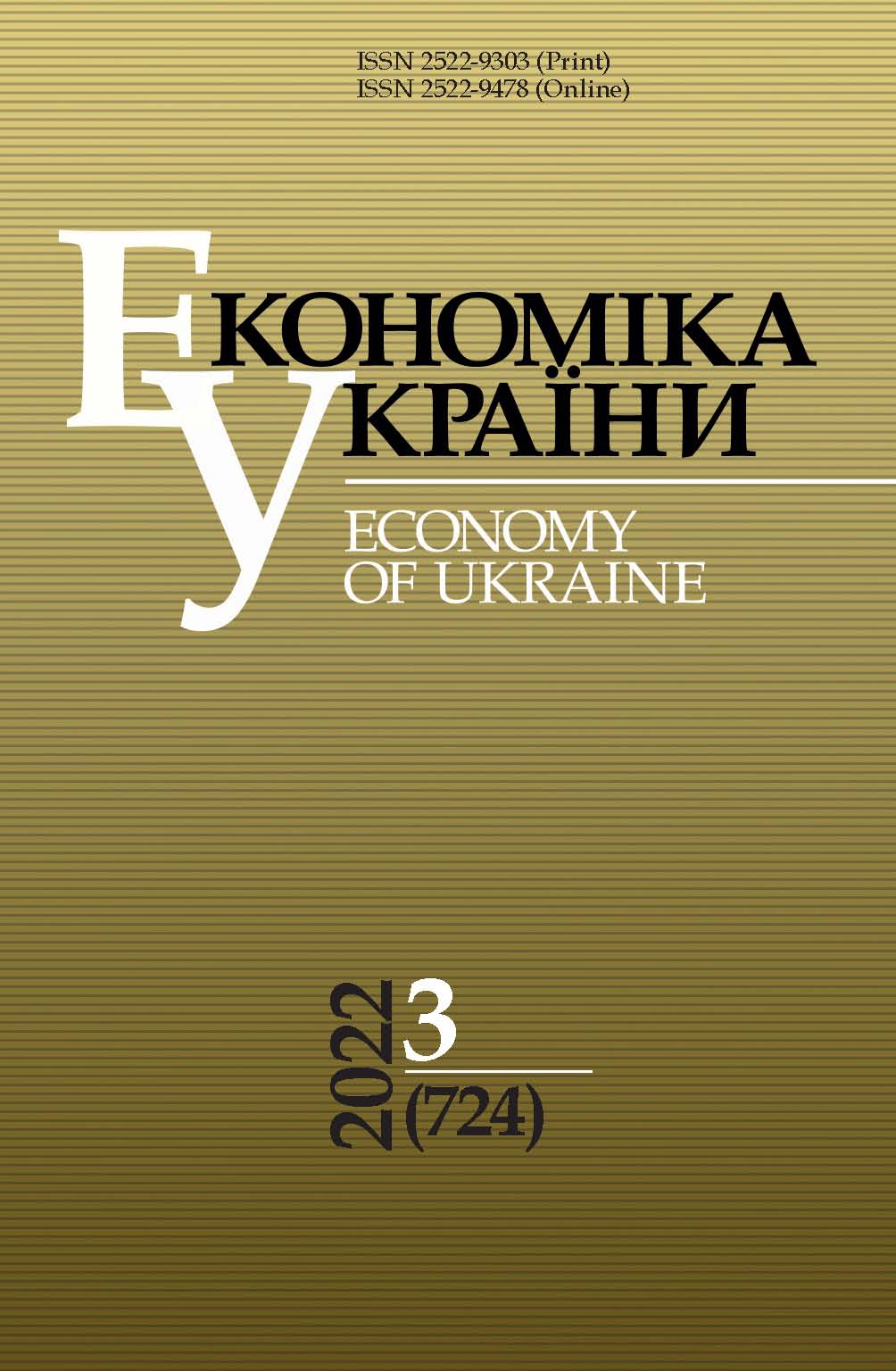METHODOLOGY OF STATISTICAL ASSESSMENT OF THE DIGITAL TRANSFORMATION OF UKRAINE STATE AND DYNAMICS
DOI:
https://doi.org/10.15407/economyukr.2022.03.039Keywords:
digital economy; digital transformation of the economy; system of indicators; composite indicators; statistical measurement procedures; SWOT analysis; disintegration of digitization indicatorsAbstract
The essence of digitalization of the economy and digital transformation of the country is determined. The influence of the factors that caused these processes onset and contributed to their strengthening and reaching the current level is assessed. Based on the analysis of the use of the latest advances in economic theory, the digital economy was defined as a communication environment for economic activity on the Internet and other mobile and sensory networks, which is formed as a result of the new general purpose technologies in information, communication and nanotechnologies transformational impact.
Based on a critical analysis of the methodology of constructing composite indices, which are currently used to assess the level of digitalization of different economies, and determining the strengths and weaknesses of each of them, the authors’ original methodology is proposed. According to the authors’ point of view, this methodology is free of the existing approaches shortcomings. It is based on summarizing the values of indices developed and analyzed by various international organizations, including UN agencies, and calculating on this basis its own integrated indicator. The value of this indicator averages the characteristics of the ten best-known indices that assess the world economy and individual countries level of digitalization.
It is concluded that according to the values of these indices, Ukraine occupies very unprestigious place among the countries of the world in terms of digitalization of their national economies. With the help of SWOT-analysis, the reserves for accelerating the economy and society of Ukraine digitalization process were determined.
The use of research results allows to increase the level of effectiveness of public policy measures in the field of forming the conceptual foundations for the development of digital economy and society and to lay the foundation for further research in this area.
References
Mantsurov I.G., Khrapunova Ya.V. Statistical Assessment of the Globalization Development of Ukraine (Methodology and Evaluation). XVІІI International Scientific-Practical Conference "New sources and methods of data propagation in statistics", 2020, pp. 47-52, available at: 194.44.12.92:8080/jspui/handle/123456789/5328
Mantsurov I. Inclusive Growth as a Basis for Countering the Global Challenges of Nowadays. Economy of Ukraine, 2018, No. 10 (683), pp. 71-87 [in Ukrainian].
doi.org/10.15407/economyukr.2018.10.071
Gudz O. Digital Economy: Changing Values and Guidelines Enterprise Management. Economics. Management. Business. 2018, No. 2 (24), pp. 4-12 [in Ukrainian].
Karcheva G., Ogorodnya D., Openko V Digital Economy And Its Influence On Development Of Domestic And International Economies. Financial Space, 2017, No. 3 (27), pp. 13-21 [in Ukrainian].
Kraus N.M., Goloborodko O.P., Kraus K.M. Digital Economy: Trends and Perspectives of the Further Development. Effective Economy, 2018, No. 1 [in Ukrainian].
Lyashenko V.I., Vyshnevskyi O.S. Digital Modernization of Ukraine's Economy as an Opportunity for Breakthrough Development. Kyiv, 2018 [in Ukrainian].
Yegorov I.Yu., Gryga V.Yu. Comparative Analysis of the Availability of Digitalization Indicators in Ukraine and Other EU Eastern Partnership Countries. Statistics of Ukraine, 2019, No. 3, pp. 56-62 [in Ukrainian].
doi.org/10.31767/su.3(86)2019.03.06
Mesenbourg T.L. Measuring the Digital Economy. U.S. Bureau of the Census, 2001.
Tapscott D. The Digital Economy: Promise and Peril in the Age of Networked Intelligence. McGraw-Hill, 1995.
Narasimhan R. The Socioeconomic Significance of Information Technology to Developing Countries. The Information Society, 1983, Vol. 2 (1), pp. 65-79.
doi.org/10.1080/01972243.1983.9959965
Keshelava A. Introduction to the "Digital" Economy. On the Threshold of the "Digital Future" Book 1. Moscow, 2017 [in Russian].
Bukht R., Heeks R. Defining, Conceptualizing and Measuring the Digital Economy. International Organisations Research Journal, 2018, available at: www.researchgate.net/publication/327356904_Defining_Conceptualising_and_Measuring_the_Digital_Economy
doi.org/10.2139/ssrn.3431732
Holroyd C., Coates K. The Global Digital Economy: A Comparative Policy Analysis. New York, Cambria Press, 2015.
Fishchuk V. Digital Infrastructure of Economic Growth. New Time, 2017, available at: biz.nv.ua/ukr/experts/fichuk/tsifrovainfrastrukturaekonomichnogozrostannja1408403.html [in Ukrainian].
Downloads
Published
How to Cite
Issue
Section
License
Copyright (c) 2022 Institute for Economics and Forecasting of the NAS of Ukraine

This work is licensed under a Creative Commons Attribution-NonCommercial-NoDerivatives 4.0 International License.



